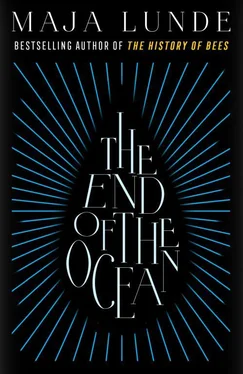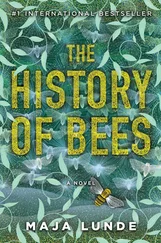“Where was it?”
She kept going. Her shoes gave off the stench of burned rubber. She used the stick to push aside charred woodwork.
“Lou, what are you doing?”
She picked her way through the rubble, placing her feet between glowing embers. Her face was red from the heat.
“Lou? Stop!”
And at exactly that moment she stopped, but not because I had told her to.
With her stick she pushed aside a huge floorboard made of some kind of plastic material.
Smoke poured out and I couldn’t bear to think about how toxic it was.
In two steps I was at her side.
“Now you have to stop!”
But then I discovered what she was standing there staring at.
“They’re destroyed. All of them burned up!” she said.
At her feet, hidden by the board, by what had previously been the floor of the women’s shower, were tin cans that had exploded. The contents oozed out. Yellow corn turned gray from ashes.
It smelled of fried ham, baked beans. Tomato sauce.
She squatted down.
“There must be something left!”
Using the stick, she started digging through the destroyed cans.
“There? No. What about that one?”
But they were all destroyed.
I pushed at the cans with my foot and the food got stuck on my shoes.
Finally, at the very bottom, we found four undamaged cans. The labels were destroyed but the cans were in one piece. I took the stick from Lou and dragged them towards me. Then I peeled off my T-shirt and used it as a pot holder.
We brought them with us, went away from there and sat alone a little way away from the burned-out ruins. I opened a can that turned out to contain beans.
They were steaming.
We shared the beans. Once again we shared her booty. And I didn’t manage to say anything today either. I was too hungry. I gobbled up the food like a dog.
We were dogs, all of us.
Lou was sniffling as she ate, drying her tears with quick movements.
“They were supposed to be for us, Daddy. For us and the boat. We were supposed to take them with us and live there. Francis helped me. We collected the cans and hid them under the floor of the women’s shower.”
I was unable to answer. I was afraid I would start crying myself. And besides… what would I say? She knew that stealing was wrong. All children know it. Anna and I had taught her that. But all the same, she had stolen again, because her hunger was controlling her thoughts. Overpowering everything else.
And me. Regardless, I had nothing to say. Damn dog that I was.
She stood up. Brushed the ashes off her clothing. “I want to go to bed now.”
*
Hall 4 looked the same. Our beds were waiting just like before. The bag in the closet. Our home was intact, I caught myself thinking.
But this wasn’t a home. Just an old warehouse full of military cots.
And we were refugees. A refugee has no home. Home was what we had lost.
Lou fell asleep right away. When Marguerite came in I was still sitting at Lou’s bedside, just as passive as before, just as listless.
I’m a lump of meat, I thought. There are no bones in me. No skeleton. Just flesh, fat, a soft mass.
Marguerite stood beside me. She said nothing. It took me a while to turn around and look at her. She was crying.
“Francis… he’s…”
And then she said it, using many words to express something very simple. I didn’t look at her, heard only how she fretted on and on. I knew from the start what she was going to say. Knew it the minute I saw him emerge from the flames, that this wouldn’t end well.
“Sorry,” she said softly. “I said we should leave, wanted to take her away, but she just ran. Straight in.”
“I never asked you to watch her,” I said.
There was a coldness in my voice, coming from I didn’t know where.
“We should have realized it,” she said. “She said it, after all, we have to help . We should have realized that she was talking about herself as well.”
“ We shouldn’t have realized anything at all.”
The cutting words flew out of my mouth, but it was the only reply I could muster. For there wasn’t any we. There was only Lou. Me. Lou and I. Marguerite wasn’t a part of it.
But Marguerite didn’t leave, she sat down with me. She continued.
“We have to leave, David.”
I didn’t reply.
“We have to get out of here.”
We. Still we .
“David?”
I got to my feet. “I’m not going anywhere.”
I left the room, left her sitting there, left Lou who was lying in bed. The embers were still smoldering at the scene of the fire. The smell of wet, charred wood filled the camp.
Christian, Caleb and Martin were sitting in the soot on the ground. A jar of pills changed hands.
“We stole it from first aid,” Caleb said when I sat down. “Everything is up for grabs now.”
“One will do away with the pain, three with the anxiety,” Martin said, his voice already listless.
I took four.
*
Everything was all right, for a while everything was all right.
My mind became sharp, my body simultaneously slow and quick.
The words pouring out of my mouth were sharp, witty, clear.
I was only interested in being. Here. Now.
I danced, on two legs, on all fours.
Rolled around with Caleb and Martin, the dirt sticking to us. I could smell the odor of soot and human beings.
Girls arrived, several of them. I took one of them, rolled around with her, too. Pounded hard inside her. I heard moans, but whether they came from her or from me, I couldn’t say.
I never saw her face, it was too dark. Or maybe I was blinded by woodsmoke.
Everything was all right. Everything was forgotten.
The approach to Bordeaux reveals a gently sloping landscape, apparently innocent, welcoming, but I still have to wait twelve hours before I can put into port, the tide takes everything with it, the waves move back and forth, the ocean rises and ebbs. I’ve seen surfers rush forward on this brown, brackish water before, but today there aren’t any here.
The moon controls us; every six hours and twelve minutes it pulls the ocean up or down. Out here, tables are everything, one lives according to the tide table. I have it on my phone, update it all the time, a dot shows me where I am in relation to low and high tide at any given moment. The moon is rising now, large and yellow as I sail carefully in along the strait, letting myself be steered by its pull, drawn towards land while the sun sets into the ocean behind me, as if it is the one I am abandoning.
The landscape around me is living two lives, twice every single day the coastline is drained of water; only a broad strip of sand, mud, shore crabs and oysters remain, where abandoned dinghies await side by side, stranded on the seabed, moored to buoys that have no purpose, no longer afloat.
And then, twelve hours later, the water is back, the boats bob on the surface, have come to life, and woe to the one that happened to be in the wrong place at the wrong time, that was taken by the tides.
*
I step onto the quay in Bordeaux, solid ground beneath my feet after such a long time, a feeling which never ceases to surprise me, because my body is used to the rocking, has long since adapted, only knows of a world in constant movement, and now I’m standing here feeling how the movement continues and it’s as if the ground beneath me, the wharf ’s concrete structure, comes towards me. How rudely and unyieldingly it meets my feet, meets my body, jars against my inner turbulence with its stability.
I make the boat fast using an extra spring line, put out all the fenders I have, but don’t think it’s enough. There are huge heaps of old tires on the quay, abandoned by other boats that have used them in the canal. I carry a few over to Blue , ease them down between the hull and the wharf, toss a couple extra on deck, thinking they may come in handy later.
Читать дальше










